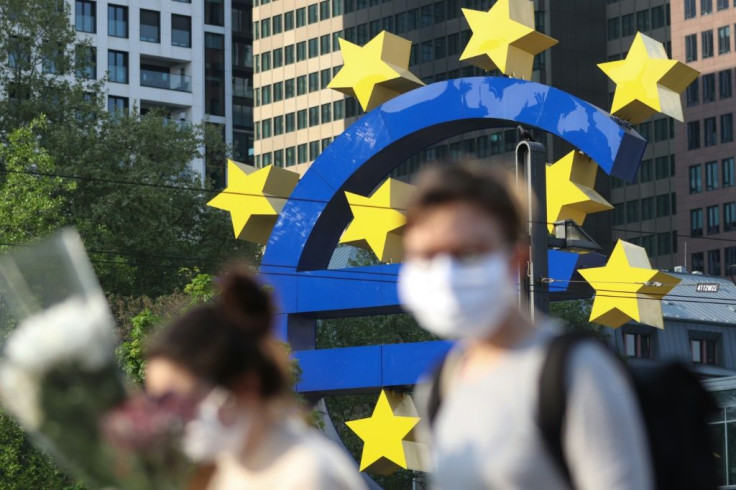ECB Says Ready To Reload In Fight Against Virus Impact

The European Central Bank said Thursday it could step up a massive bond-buying scheme launched last month to cushion the impact of the coronavirus pandemic, as data showed the eurozone economy stumbled in the first quarter.
The ECB "is fully prepared to increase the size of the Pandemic Emergency Purchase Programme (PEPP) and adjust its composition, by as much as is necessary and for as long as needed," a spokesman said following a policymakers' meeting.
Earlier Thursday, data from the EU's official statistics agency Eurostat showed eurozone gross domestic product contracted by 3.8 percent in January-March -- the worst quarterly drop since Eurostat records began in 1995.
At present, PEPP provides for 750 billion euros of government and corporate bonds by the end of 2020, bringing the ECB's arsenal of "quantitative easing" (QE) asset purchases to around 1.1 trillion euros ($1.2 trillion) this year.
The Frankfurt institution left key interest rates unchanged, but said it would make conditions on a massive programme of cheap loans to banks -- known as TLTROs -- more favourable to encourage lending to the real economy.
At their most generous, variable interest rates on the loans will reach -1.0 percent -- meaning the ECB is effectively paying banks to take cash.
And it will add a new series of credit to lenders over the coming months to further buttress the financial system through the worst of the pandemic, dubbing them Pandemic Emergency Longer-Term Refinancing Operations (PELTROs).
The new loan programme will also include the possibility of negative interest rates for borrowers.
Thursday's changes showed the ECB would do "whatever it takes, but for banks to fund the recovery," tweeted Pictet Wealth Management strategist Frederik Ducrozet.
In 2012, then-ECB president Mario Draghi promised to do "whatever it takes" to preserve the euro single currency, a phrase that ultimately heralded controversial mass government bond purchases credited with avoiding deflation from 2015.
Draghi's successor Christine Lagarde will explain the bank's latest moves in a telephone conference with journalists from 1230 GMT.
Lagarde is likely to reiterate her March statement targeted at national leaders that "an ambitious and coordinated fiscal stance is now needed in view of the weakened outlook and to safeguard against the further materialisation of downside risks".
Last week, Lagarde week warned European leaders they risked doing "too little, too late" as the pandemic threatens a 15-percent drop in eurozone GDP this year.
With no agreement at an April 24 government chiefs' meeting, for now "it's again up to the ECB to do the economic policy heavy lifting and fight the recessionary effects of the crisis," Eric Dor of France's IESEG business school told AFP ahead of Thursday's decisions.
The crisis threatens the ECB's primary objective of maintaining inflation around 2.0 percent, with price growth in the single currency area falling to just 0.4 percent in April.
Looking ahead, "the depth of the contraction, low inflation and falling inflation expectations and the risk of a further widening of government yield spreads" all argue for stocking up measures like PEPP at some point, ING bank economist Carsten Brzeski said ahead of Thursday's meeting.
So far the central bank's backstop for the bond market has not stopped the difference -- "spread" -- between returns investors can expect on benchmark German government bonds and those of heavily-indebted eurozone members like Italy widening in recent weeks.
Nor did a decision to accept debt downgraded to "junk" status as collateral for loans to banks made under the TLTRO bank lending scheme.
A tool the central bank could still deploy is relaxing rules banning purchases of bonds that drop below investment grade during the crisis, matching the step on collateral.
Lagarde will likely explain how decisions like abandoning limits on what proportion of any country's debt the ECB can hold have made its purchase programmes more effective.
© Copyright AFP {{Year}}. All rights reserved.





















